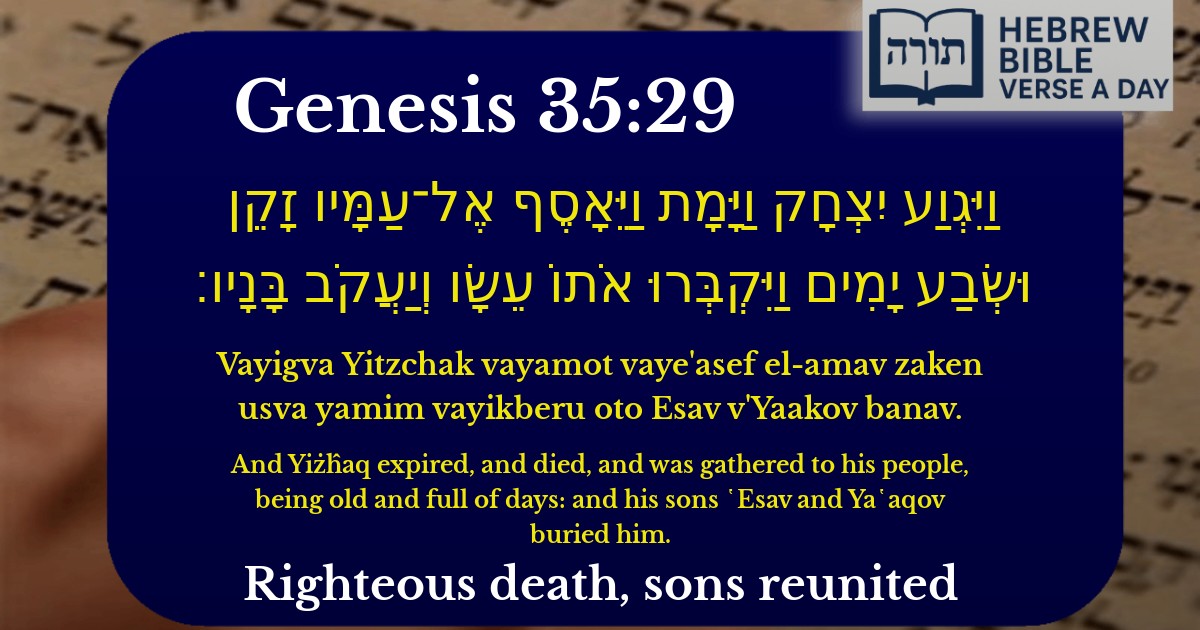Join Our Newsletter To Be Informed When New Videos Are Posted
Join the thousands of fellow Studends who rely on our videos to learn how to read the bible in Hebrew for free!
Hebrew Text
וַיִּגְוַע יִצְחָק וַיָּמָת וַיֵּאָסֶף אֶל־עַמָּיו זָקֵן וּשְׂבַע יָמִים וַיִּקְבְּרוּ אֹתוֹ עֵשָׂו וְיַעֲקֹב בָּנָיו׃
English Translation
And Yiżĥaq expired, and died, and was gathered to his people, being old and full of days: and his sons ῾Esav and Ya῾aqov buried him.
Transliteration
Vayigva Yitzchak vayamot vaye'asef el-amav zaken usva yamim vayikberu oto Esav v'Yaakov banav.
Hebrew Leining Text
וַיִּגְוַ֨ע יִצְחָ֤ק וַיָּ֙מׇת֙ וַיֵּאָ֣סֶף אֶל־עַמָּ֔יו זָקֵ֖ן וּשְׂבַ֣ע יָמִ֑ים וַיִּקְבְּר֣וּ אֹת֔וֹ עֵשָׂ֥ו וְיַעֲקֹ֖ב בָּנָֽיו׃ <span class="mam-spi-pe">{פ}</span><br>
וַיִּגְוַ֨ע יִצְחָ֤ק וַיָּ֙מׇת֙ וַיֵּאָ֣סֶף אֶל־עַמָּ֔יו זָקֵ֖ן וּשְׂבַ֣ע יָמִ֑ים וַיִּקְבְּר֣וּ אֹת֔וֹ עֵשָׂ֥ו וְיַעֲקֹ֖ב בָּנָֽיו׃ {פ}
🎵 Listen to leining
Parasha Commentary
📚 Talmud Citations
This verse is quoted in the Talmud.
📖 Bava Batra 16b
The verse is referenced in a discussion about the death of Isaac and the reconciliation between Esau and Jacob, illustrating the fulfillment of Isaac's days and the joint burial by his sons.


The Passing of Yitzchak
The verse states, "וַיִּגְוַע יִצְחָק וַיָּמָת וַיֵּאָסֶף אֶל־עַמָּיו" ("And Yitzchak expired, and died, and was gathered to his people"). Rashi explains that the threefold description of Yitzchak's passing—"expired," "died," and "gathered to his people"—emphasizes the completeness of his transition from this world to the next. The phrase "gathered to his people" (וַיֵּאָסֶף אֶל־עַמָּיו) is a common biblical expression for death, indicating that the soul joins the righteous in the World to Come (Olam Haba).
Old and Full of Days
The verse describes Yitzchak as "זָקֵן וּשְׂבַע יָמִים" ("old and full of days"). The Midrash (Bereishit Rabbah 65:9) notes that Yitzchak was the first person in the Torah to be described as "full of days," signifying that he lived a complete and fulfilled life. Unlike Avraham and Yaakov, whose lives were marked by trials and struggles, Yitzchak's years were characterized by relative tranquility, particularly after the Akeidah (Binding of Isaac). The Rambam (Hilchot Teshuvah 8:1) teaches that true fulfillment comes from a life dedicated to Torah and mitzvot, which Yitzchak embodied.
The Burial by Esav and Yaakov
The verse concludes with "וַיִּקְבְּרוּ אֹתוֹ עֵשָׂו וְיַעֲקֹב בָּנָיו" ("and his sons Esav and Yaakov buried him"). The Talmud (Sotah 13a) comments that despite their lifelong conflict, Esav and Yaakov temporarily set aside their differences to honor their father. This teaches the importance of kibud av (honoring parents), which supersedes even personal disputes. The Kli Yakar adds that their joint burial of Yitzchak symbolizes the eventual reconciliation of their descendants in the messianic era, as prophesied in Ovadiah 1:21.